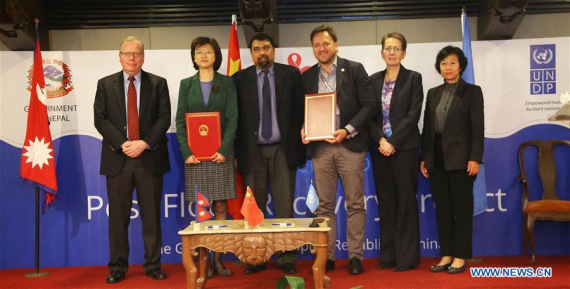
Delagates pose for group photos during the closing ceremony of the Post Flood Recovery Project, in Kathmandu, Nepal, March 26, 2018. (Xinhua/Sunil Sharma)
In Nepal's Terai region, 31,800 families severely affected by one of the worst floods hitting the region in August 2017 are able to recover from the disaster and smile again with the help of Chinese aid, local authorities said here on Monday.
The swift recovery of the flood victims has been made possible by the Post-Flood Recovery Program, under the framework of the China South-South Cooperation Assistance Fund.
The three-month long project was implemented by the United Nations Development Program Nepal in coordination with Nepal's Post Flood Reconstruction and Rehabilitation Project under the auspices of the National Reconstruction Authority (NRA).
"The aid from China has reached the needy and marginalized communities of the Terai region," Dr. Suman Karna, Project Chief at the Post Flood Reconstruction and Rehabilitation Project at the NRA, said.
"It has not only put smiles back on their faces, but has also given them the confidence to get back on their feet and earn a livelihood," he said during the formal closing of the three-month long project.
As Terai is a poverty and unemployment stricken region, it requires special attention, Karna said. China's disaster relief experience could be valuable for Nepal, which is also vulnerable to natural disasters, he added.
Karna's statement was echoed by the mayors and deputy mayors of Dhanusha and Rajbiraj, two districts that border India which were hard-hit by the floods.
"The relief packages were distributed in such a way that even disabled people were not left behind and there were no duplications nor any mismanagement. But we need to have long-term solutions," Sadhana Jha, Deputy Mayor of the Rajbiraj Municipality, said.
The Chinese aid came in response to the extensive damage and displacement caused by the floods in the country's southern region. A post-flood assessment conducted by the Nepali government found that 1.7 million people had been affected by the disaster, with 134 killed in the 18 worst-hit districts.
The project supported 31,800 households in seven districts spanning Sunsari, Saptari, Sarlahi, Dhanusha, Mahottari, Rautahat and Parsa located in Provinces 1 and 2.
For her part, Chinese Ambassador to Nepal Yu Hong said that as a good neighbor, the Chinese people could feel the suffering of the Nepali people, who experienced the heaviest rainfall and floods recorded in 60 years.
"In November, we offered 4 million U.S. dollars to help the Nepali people in the flood-affected Terai region to help them recover from the disaster. The assistance has reached more than 31,800 households and I am glad that the non-food items provided by the Chinese government could bring warmth to the families," ambassador Yu said.
The ambassador further said that China will continue to provide assistance and support to Nepal within its capacity and make contributions to Nepal's post-disaster reconstruction and social and economic development.
Under the support from China, the victims were provided with non-food items like shawls, blankets, cooking utensils, insecticide-treated bed nets, clean cooking stoves, water filters and hygiene kits.
Valerie Julliand, UN Resident Coordinator in Nepal, said: "This project was much-needed, targeted and timely, which contributed to the health and well being of the flood victims."
She also stressed the need for effective disaster risk management and for building long-term resilience.
On the occasion of the closing of the three-month long project, the visiting UN Resident Coordinator in China, Nicholas Rossellini, praised the trilateral cooperation between China, Nepal and the United Nations.
"Post-disaster conditions need immense partnership within the country and with international partners, as well as political will, technical assistance, financial support and innovative approaches," Rosellini said.
In many ways this project has demonstrated these vital facets, he said.


















































